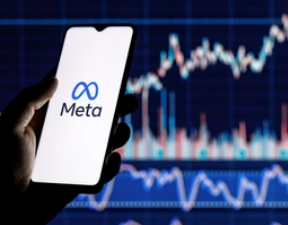
Haiden Holmes
Apr 28, 2022 10:02

Facebook (NASDAQ:FB) recovered from a user decline earlier this year, and its parent company Meta above Wall Street earnings estimates, defying low investor expectations with a quarterly report that pushed shares up 20%.
Additionally, Meta CEO Mark Zuckerberg stated that the firm would cut costs and invest in artificial intelligence tools to improve recommendation and advertising, indicating that Meta is focusing on profitability while pursuing its long-term goal of building the metaverse.
Its shares increased 19 percent on Wednesday after-hours trading.
Meta's profit well exceeded Wall Street expectations, coming in at $2.72 per share, compared to an average analyst forecast of $2.56, according to Refinitiv's IBES data. Meta's earnings beats were offset by the slowest revenue increase in a decade.
According to IBES statistics from Refinitiv, Facebook daily active users (DAU), a critical indicator for marketers, were 1.96 billion, slightly higher than the estimate of 1.95 billion. Monthly active users were 2.94 billion, falling 30 million short of Wall Street projections.
Meta has lost roughly half of its value since the beginning of the year, following a dismal February earnings report in which Facebook's daily active users fell for the first time in years and the company forecasted a bleak quarter, blaming ongoing factors such as Apple's (NASDAQ:AAPL) privacy changes and increased competition from platforms like ByteDance's TikTok.
"It's encouraging that Meta was able to sustain growth in DAU. It needs to demonstrate a significant improvement over the previous quarter's performance "Debra Williamson, an analyst with Insider Intelligence, stated.
"Monthly active user growth, on the other hand, has slowed significantly. It was possible a few quarters ago to rely on emerging markets to keep the growth engine humming, but it is likely that even these high-growth possibilities are beginning to dwindle "'She stated.
Total revenue, which is largely advertising revenues, increased 7% to $27.91 billion in the first quarter, but fell short of analysts' expectations of $28.20 billion, according to IBES data from Refinitiv.
Chief Financial Officer Dave Wehner mentioned a number of causes in a conference call with analysts on Wednesday, including a slowdown in ecommerce following strong growth during the COVID-19 epidemic, revenue loss in Russia, and decreased ad demand amid global economic uncertainties. On the call, Zuckerberg also reiterated prior cautions about the difficulties associated with engagement shifting toward features such as its short video product Reels, which earns less revenue than other ad formats.
Russia banned Facebook and Instagram in March, accusing Meta of "extremist conduct" during Moscow's invasion of Ukraine. The prohibition does not apply to Meta's messaging application WhatsApp. Additionally, Meta has prohibited Russian marketers from generating and running ads elsewhere in the world.
Meta predicted sales of between $28 billion and $30 billion for the second quarter. On average, analysts anticipated current-quarter revenue of $30.63 billion. The company stated that its perspective was influenced by a number of variables, including the Ukraine war, and that it was monitoring the possible impact of European regulatory changes.
Recent earnings reports from Google parent Alphabet (NASDAQ:GOOGL) Inc and Snap Inc (NYSE:SNAP) indicate that the global economic turbulence is having an effect on digital advertising spending, as inflation continues to rise and geopolitical concern persists.
"I believe that following Google, expectations were set for the worst-case scenario," said Rick Meckler, a partner at Cherry Lane Investments, a New Vernon, New Jersey-based family investment firm. "When they beat projections on earnings per share, I believe that those who had shorted the stock and others who had...given up on it opted to reinvest."
Meta reduced its forecast for overall expenses in 2022 to between $87 billion and $92 billion, from $90 billion to $95 billion previously.
Meta executives stated during the call that the company is investing heavily in artificial intelligence and machine learning to enhance its ad capabilities as it grapples with the impact of Apple's operating system changes, which have made it more difficult for brands to target and measure their ads on Facebook and Instagram.
However, Zuckerberg said that Meta was limiting the pace of some longer-term investments in its AI infrastructure and Reality Labs hardware division, which houses the company's augmented and virtual reality activities.
Meta's Reality Labs hardware division generated $695 million in quarterly revenue. It reported losses of $3 billion from operations related to these metaverse goals.
Zuckerberg has cautioned that it will take billions of dollars and several years for Meta to accomplish its metaverse ambitions, a futuristic concept of virtual spaces where users may work, socialize, and play.

Apr 28, 2022 10:00

Apr 29, 2022 09:51